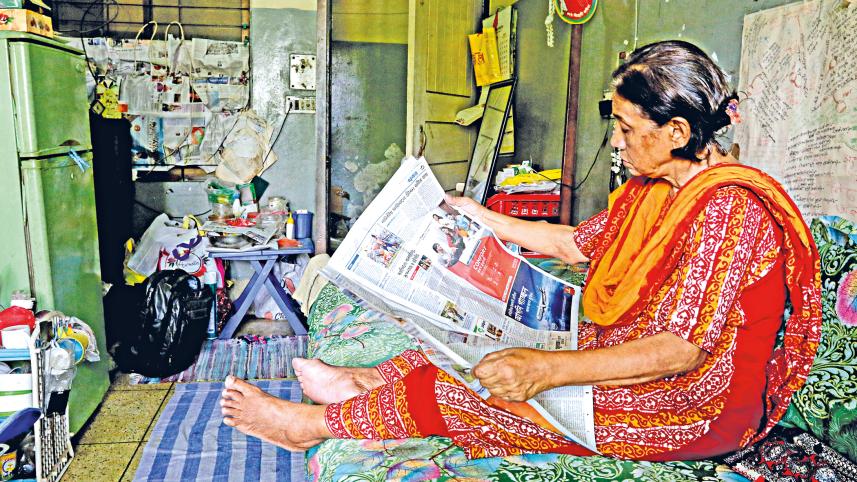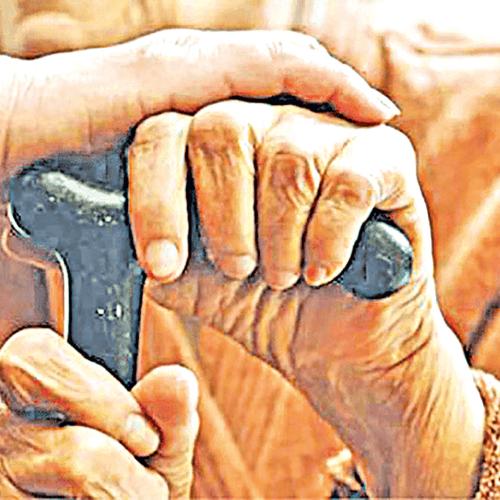Empty homes, empty promises: Who will stand by our parents?

There was a time in Bangladesh when the family home was more than just a roof over one's head—it was a living institution. Generations grew together under its shade, sharing meals, quarrels, stories, and responsibilities. Old age was never lonely; it was filled with warmth, community, and care. In those days, children were not just economic contributors but the promise of security, affection, and dignity in their parents' twilight years. To grow old meant to be surrounded by those whom you had raised, to live with respect in a home that echoed with shared histories.
But times have changed. Today, the story is different. A new wave of migration has swept across Bangladesh, especially among the younger generation, the only path to success in a nation where political and economic instability pushes people to escape rather than rebuild. Every day, thousands line up for IELTS coaching centres, visas, and student permits—dreaming of settling abroad for a better life. While these journeys bring remittances, they also leave behind broken households.

Parents, once considered the cornerstone of family life, now find themselves alone in empty homes. The big dream for the youth has become leaving the country, but what becomes of those who are left behind? They are left in deserted houses, living not with their children but with memories. What once was the warm sound of laughter is replaced by silence, and the family home has turned into an unspoken alternative to an old age home.
Is money the only thing parents deserve after raising their children with love and sacrifice? Or do they deserve companionship, care, and dignity in their old age? It is heartbreaking that we even have to ask these questions. Even more troubling is how society is slowly adapting to this reality, adjusting to emptiness, normalising absence.
The crisis is real and growing. Bangladesh is undergoing a rapid demographic transition, with its elderly population increasing much faster than the overall population. According to the Bangladesh Bureau of Statistics, people aged 60 and above made up about 7–8% of the population in 2015, rising to around 9–9.5%—about 16 million people—by 2023 (BBC, 2024).
Projections from the UN and World Bank indicate that by 2050 nearly 20–22% of citizens—or roughly 44–45 million people—will be elderly, nearly tripling since the start of the century (World Bank, 2023). Although the government has introduced social protection measures such as the old age allowance and, more recently, a universal pension scheme, coverage remains limited. In practice, the old age allowance reaches only about one third of elderly citizens and provides very low benefits, and the new pension scheme launched in 2023 requires at least 10 years of contributions, making it inaccessible for many informal sector workers.
Alongside economic insecurity, loneliness and social isolation are widespread; studies on Bangladeshi older adults have found that more than half report feeling lonely, particularly women, rural residents, and those living alone after their children migrate abroad.
Researchers describe a "systematic neglect" of elderly care, as the erosion of the joint family system combined with weak state support leaves millions of older Bangladeshis facing old age without adequate security, dignity, or companionship.

This abandonment is not just personal, it is systemic. Social values have shifted: children are no longer seen as lifelong companions of their parents but as economic projects. Parents invest everything in educating their children, often at the cost of their own well-being, only to see them disappear overseas, leaving behind remittances in place of love. Physical presence and affection have largely been replaced by short video calls once a day or once a week.
The future is grim if nothing changes. An ageing population, coupled with an unstable political order, will mean millions of abandoned elderly living in isolation. The state has shown little initiative in creating sustainable eldercare systems, and in a society where the focus is solely on political and economic survival, compassion risks being written out of our collective values.
Money may flow in from abroad, but what is the price of this money if it costs parents their dignity and companionship? Bangladesh stands at a moral and political crossroads. If the family is the backbone of society, what happens when the backbone weakens? Who will take care of the parents when dreams of migration overshadow dreams of togetherness?
Empty homes cannot provide care, remittances cannot wipe away loneliness, and no amount of political rhetoric can replace the presence of a child sitting beside an ageing mother or father. It is time we confront this uncomfortable truth: in a nation where "nothing gets fixed", perhaps the most urgent question is not just about politics or economics, but about our humanity itself.
Jobeda Akter Rini, is a M.A student in Department of Sociology at South Asian University, New Delhi. She can be reached at jarini0109@gmail.com



 For all latest news, follow The Daily Star's Google News channel.
For all latest news, follow The Daily Star's Google News channel.
Comments